Organisational Behaviour Report: Examining TUI Group's Practices
VerifiedAdded on 2023/01/19
|19
|6149
|80
Report
AI Summary
This report provides an in-depth analysis of organisational behaviour within the TUI Group, a major international travel and tourism company. The report begins with an executive summary and introduction to organisational behaviour, emphasizing its role in understanding individual and group actions to achieve desired outcomes. The report then delves into specific aspects of TUI's operations, including an analysis of its organizational culture using Handy's model, examining power dynamics through French & Raven's power types, and exploring the impact of organizational politics. The report further investigates content and process theories of motivation, and discusses factors contributing to effective team building. Finally, it concludes with recommendations and a summary of the key concepts and philosophies of organisational behaviour in the context of the TUI Group and business situations.
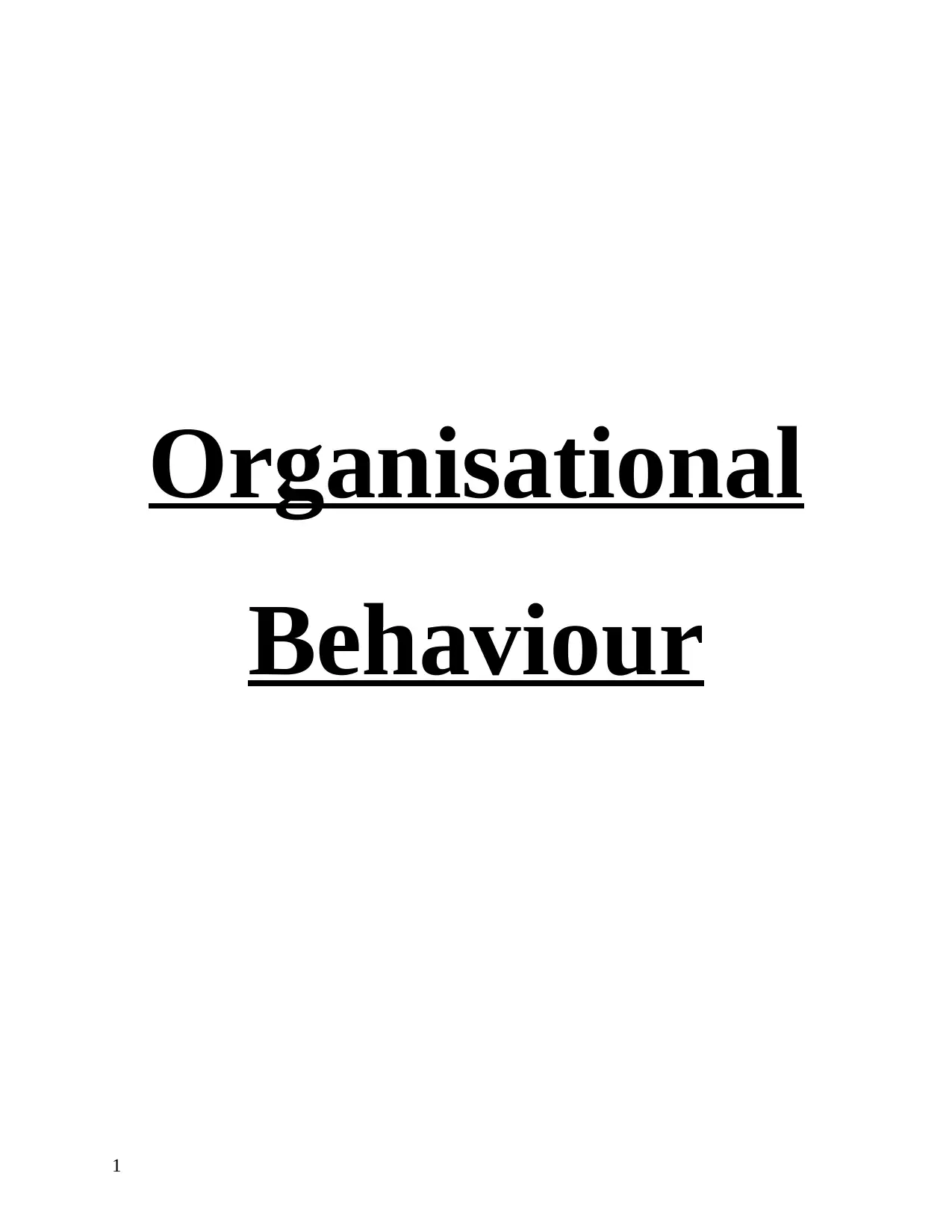
Organisational
Behaviour
1
Behaviour
1
Paraphrase This Document
Need a fresh take? Get an instant paraphrase of this document with our AI Paraphraser
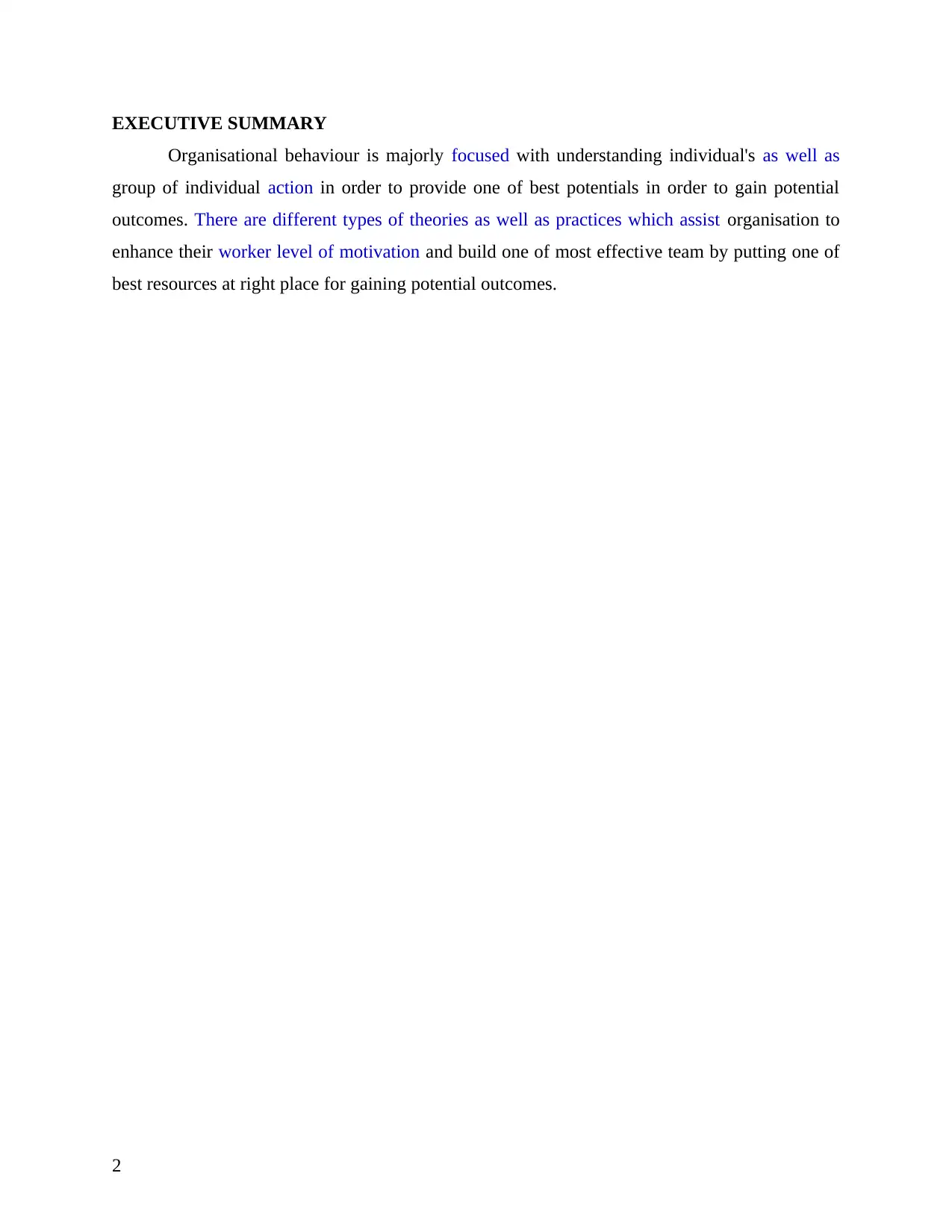
EXECUTIVE SUMMARY
Organisational behaviour is majorly focused with understanding individual's as well as
group of individual action in order to provide one of best potentials in order to gain potential
outcomes. There are different types of theories as well as practices which assist organisation to
enhance their worker level of motivation and build one of most effective team by putting one of
best resources at right place for gaining potential outcomes.
2
Organisational behaviour is majorly focused with understanding individual's as well as
group of individual action in order to provide one of best potentials in order to gain potential
outcomes. There are different types of theories as well as practices which assist organisation to
enhance their worker level of motivation and build one of most effective team by putting one of
best resources at right place for gaining potential outcomes.
2
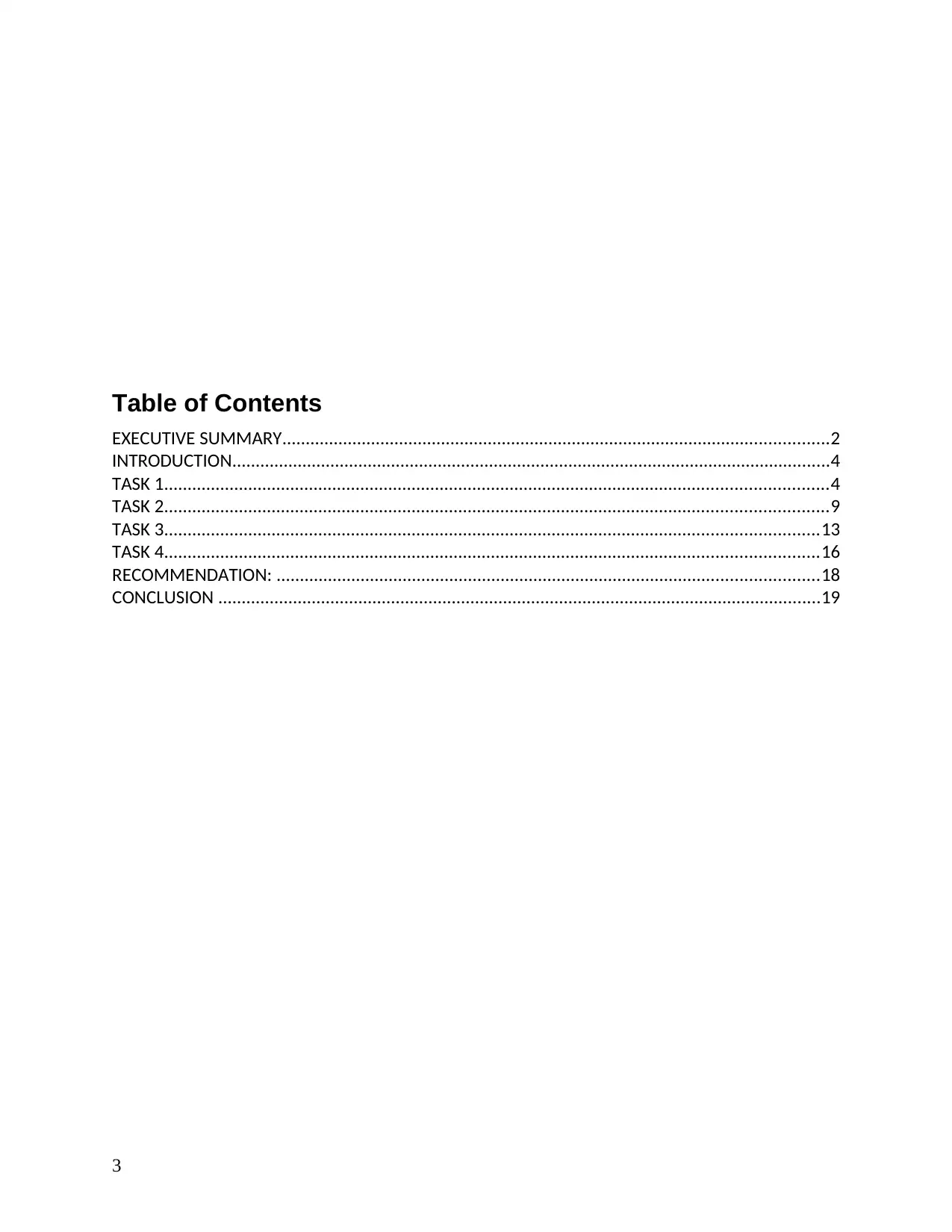
Table of Contents
EXECUTIVE SUMMARY.....................................................................................................................2
INTRODUCTION................................................................................................................................4
TASK 1..............................................................................................................................................4
TASK 2..............................................................................................................................................9
TASK 3............................................................................................................................................13
TASK 4............................................................................................................................................16
RECOMMENDATION: ....................................................................................................................18
CONCLUSION .................................................................................................................................19
3
EXECUTIVE SUMMARY.....................................................................................................................2
INTRODUCTION................................................................................................................................4
TASK 1..............................................................................................................................................4
TASK 2..............................................................................................................................................9
TASK 3............................................................................................................................................13
TASK 4............................................................................................................................................16
RECOMMENDATION: ....................................................................................................................18
CONCLUSION .................................................................................................................................19
3
⊘ This is a preview!⊘
Do you want full access?
Subscribe today to unlock all pages.

Trusted by 1+ million students worldwide
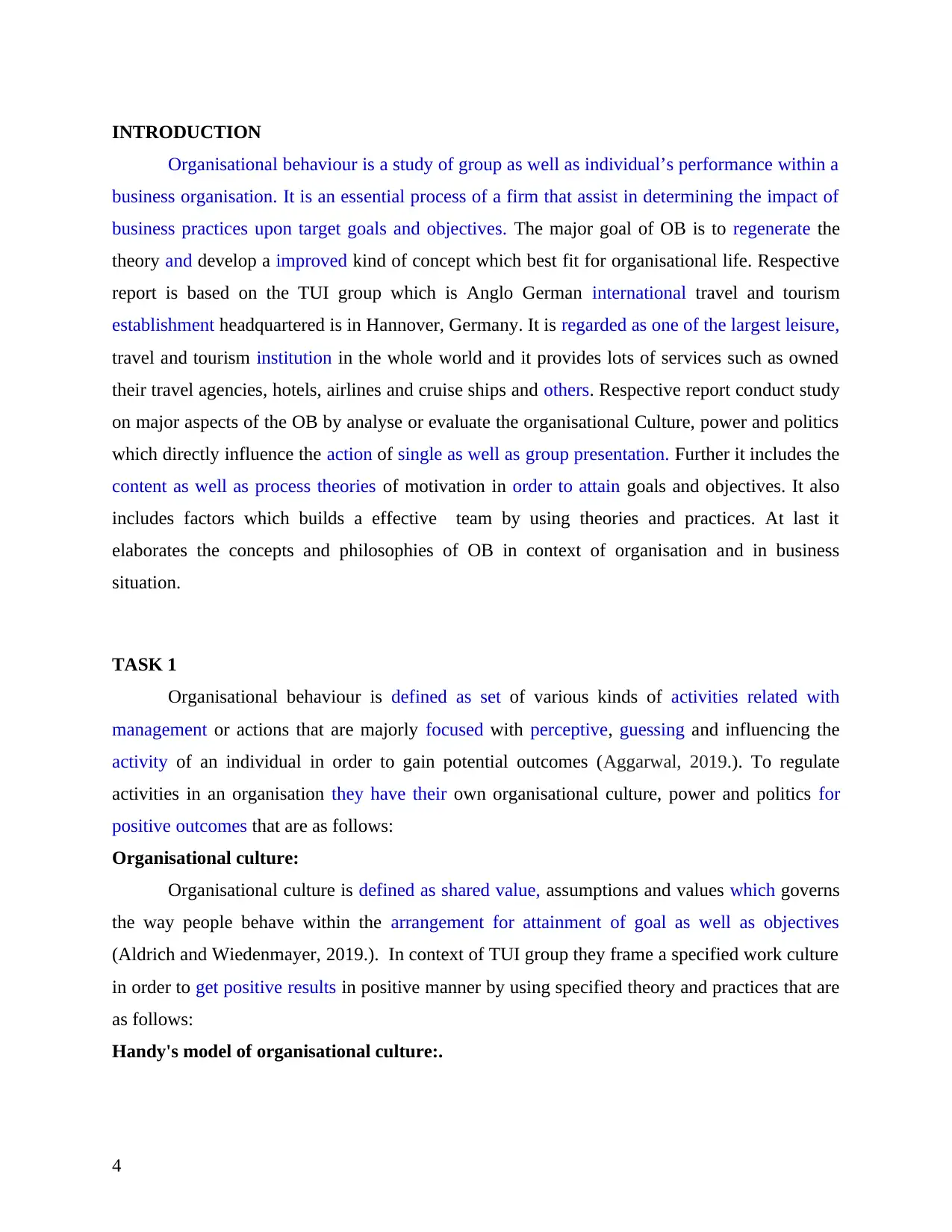
INTRODUCTION
Organisational behaviour is a study of group as well as individual’s performance within a
business organisation. It is an essential process of a firm that assist in determining the impact of
business practices upon target goals and objectives. The major goal of OB is to regenerate the
theory and develop a improved kind of concept which best fit for organisational life. Respective
report is based on the TUI group which is Anglo German international travel and tourism
establishment headquartered is in Hannover, Germany. It is regarded as one of the largest leisure,
travel and tourism institution in the whole world and it provides lots of services such as owned
their travel agencies, hotels, airlines and cruise ships and others. Respective report conduct study
on major aspects of the OB by analyse or evaluate the organisational Culture, power and politics
which directly influence the action of single as well as group presentation. Further it includes the
content as well as process theories of motivation in order to attain goals and objectives. It also
includes factors which builds a effective team by using theories and practices. At last it
elaborates the concepts and philosophies of OB in context of organisation and in business
situation.
TASK 1
Organisational behaviour is defined as set of various kinds of activities related with
management or actions that are majorly focused with perceptive, guessing and influencing the
activity of an individual in order to gain potential outcomes (Aggarwal, 2019.). To regulate
activities in an organisation they have their own organisational culture, power and politics for
positive outcomes that are as follows:
Organisational culture:
Organisational culture is defined as shared value, assumptions and values which governs
the way people behave within the arrangement for attainment of goal as well as objectives
(Aldrich and Wiedenmayer, 2019.). In context of TUI group they frame a specified work culture
in order to get positive results in positive manner by using specified theory and practices that are
as follows:
Handy's model of organisational culture:.
4
Organisational behaviour is a study of group as well as individual’s performance within a
business organisation. It is an essential process of a firm that assist in determining the impact of
business practices upon target goals and objectives. The major goal of OB is to regenerate the
theory and develop a improved kind of concept which best fit for organisational life. Respective
report is based on the TUI group which is Anglo German international travel and tourism
establishment headquartered is in Hannover, Germany. It is regarded as one of the largest leisure,
travel and tourism institution in the whole world and it provides lots of services such as owned
their travel agencies, hotels, airlines and cruise ships and others. Respective report conduct study
on major aspects of the OB by analyse or evaluate the organisational Culture, power and politics
which directly influence the action of single as well as group presentation. Further it includes the
content as well as process theories of motivation in order to attain goals and objectives. It also
includes factors which builds a effective team by using theories and practices. At last it
elaborates the concepts and philosophies of OB in context of organisation and in business
situation.
TASK 1
Organisational behaviour is defined as set of various kinds of activities related with
management or actions that are majorly focused with perceptive, guessing and influencing the
activity of an individual in order to gain potential outcomes (Aggarwal, 2019.). To regulate
activities in an organisation they have their own organisational culture, power and politics for
positive outcomes that are as follows:
Organisational culture:
Organisational culture is defined as shared value, assumptions and values which governs
the way people behave within the arrangement for attainment of goal as well as objectives
(Aldrich and Wiedenmayer, 2019.). In context of TUI group they frame a specified work culture
in order to get positive results in positive manner by using specified theory and practices that are
as follows:
Handy's model of organisational culture:.
4
Paraphrase This Document
Need a fresh take? Get an instant paraphrase of this document with our AI Paraphraser
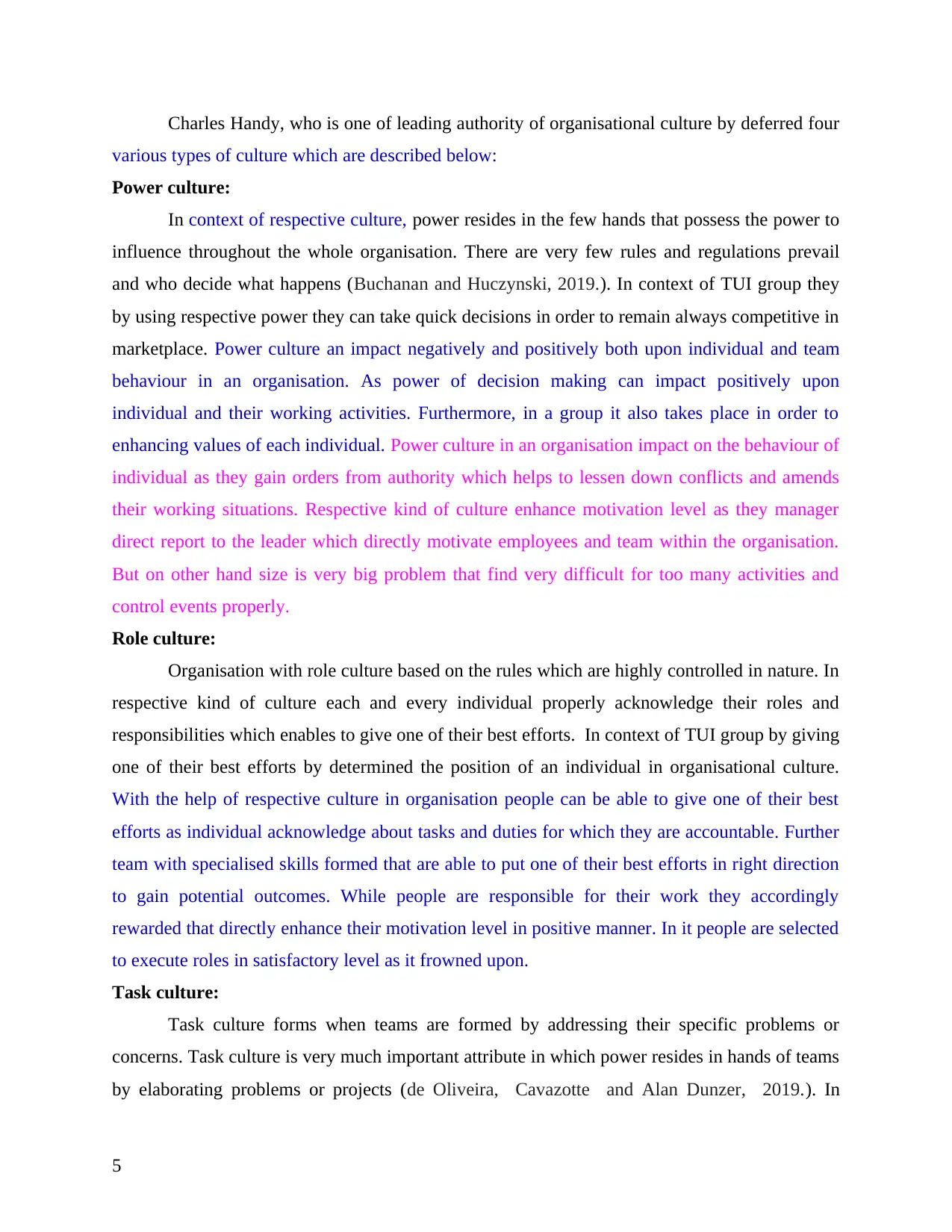
Charles Handy, who is one of leading authority of organisational culture by deferred four
various types of culture which are described below:
Power culture:
In context of respective culture, power resides in the few hands that possess the power to
influence throughout the whole organisation. There are very few rules and regulations prevail
and who decide what happens (Buchanan and Huczynski, 2019.). In context of TUI group they
by using respective power they can take quick decisions in order to remain always competitive in
marketplace. Power culture an impact negatively and positively both upon individual and team
behaviour in an organisation. As power of decision making can impact positively upon
individual and their working activities. Furthermore, in a group it also takes place in order to
enhancing values of each individual. Power culture in an organisation impact on the behaviour of
individual as they gain orders from authority which helps to lessen down conflicts and amends
their working situations. Respective kind of culture enhance motivation level as they manager
direct report to the leader which directly motivate employees and team within the organisation.
But on other hand size is very big problem that find very difficult for too many activities and
control events properly.
Role culture:
Organisation with role culture based on the rules which are highly controlled in nature. In
respective kind of culture each and every individual properly acknowledge their roles and
responsibilities which enables to give one of their best efforts. In context of TUI group by giving
one of their best efforts by determined the position of an individual in organisational culture.
With the help of respective culture in organisation people can be able to give one of their best
efforts as individual acknowledge about tasks and duties for which they are accountable. Further
team with specialised skills formed that are able to put one of their best efforts in right direction
to gain potential outcomes. While people are responsible for their work they accordingly
rewarded that directly enhance their motivation level in positive manner. In it people are selected
to execute roles in satisfactory level as it frowned upon.
Task culture:
Task culture forms when teams are formed by addressing their specific problems or
concerns. Task culture is very much important attribute in which power resides in hands of teams
by elaborating problems or projects (de Oliveira, Cavazotte and Alan Dunzer, 2019.). In
5
various types of culture which are described below:
Power culture:
In context of respective culture, power resides in the few hands that possess the power to
influence throughout the whole organisation. There are very few rules and regulations prevail
and who decide what happens (Buchanan and Huczynski, 2019.). In context of TUI group they
by using respective power they can take quick decisions in order to remain always competitive in
marketplace. Power culture an impact negatively and positively both upon individual and team
behaviour in an organisation. As power of decision making can impact positively upon
individual and their working activities. Furthermore, in a group it also takes place in order to
enhancing values of each individual. Power culture in an organisation impact on the behaviour of
individual as they gain orders from authority which helps to lessen down conflicts and amends
their working situations. Respective kind of culture enhance motivation level as they manager
direct report to the leader which directly motivate employees and team within the organisation.
But on other hand size is very big problem that find very difficult for too many activities and
control events properly.
Role culture:
Organisation with role culture based on the rules which are highly controlled in nature. In
respective kind of culture each and every individual properly acknowledge their roles and
responsibilities which enables to give one of their best efforts. In context of TUI group by giving
one of their best efforts by determined the position of an individual in organisational culture.
With the help of respective culture in organisation people can be able to give one of their best
efforts as individual acknowledge about tasks and duties for which they are accountable. Further
team with specialised skills formed that are able to put one of their best efforts in right direction
to gain potential outcomes. While people are responsible for their work they accordingly
rewarded that directly enhance their motivation level in positive manner. In it people are selected
to execute roles in satisfactory level as it frowned upon.
Task culture:
Task culture forms when teams are formed by addressing their specific problems or
concerns. Task culture is very much important attribute in which power resides in hands of teams
by elaborating problems or projects (de Oliveira, Cavazotte and Alan Dunzer, 2019.). In
5
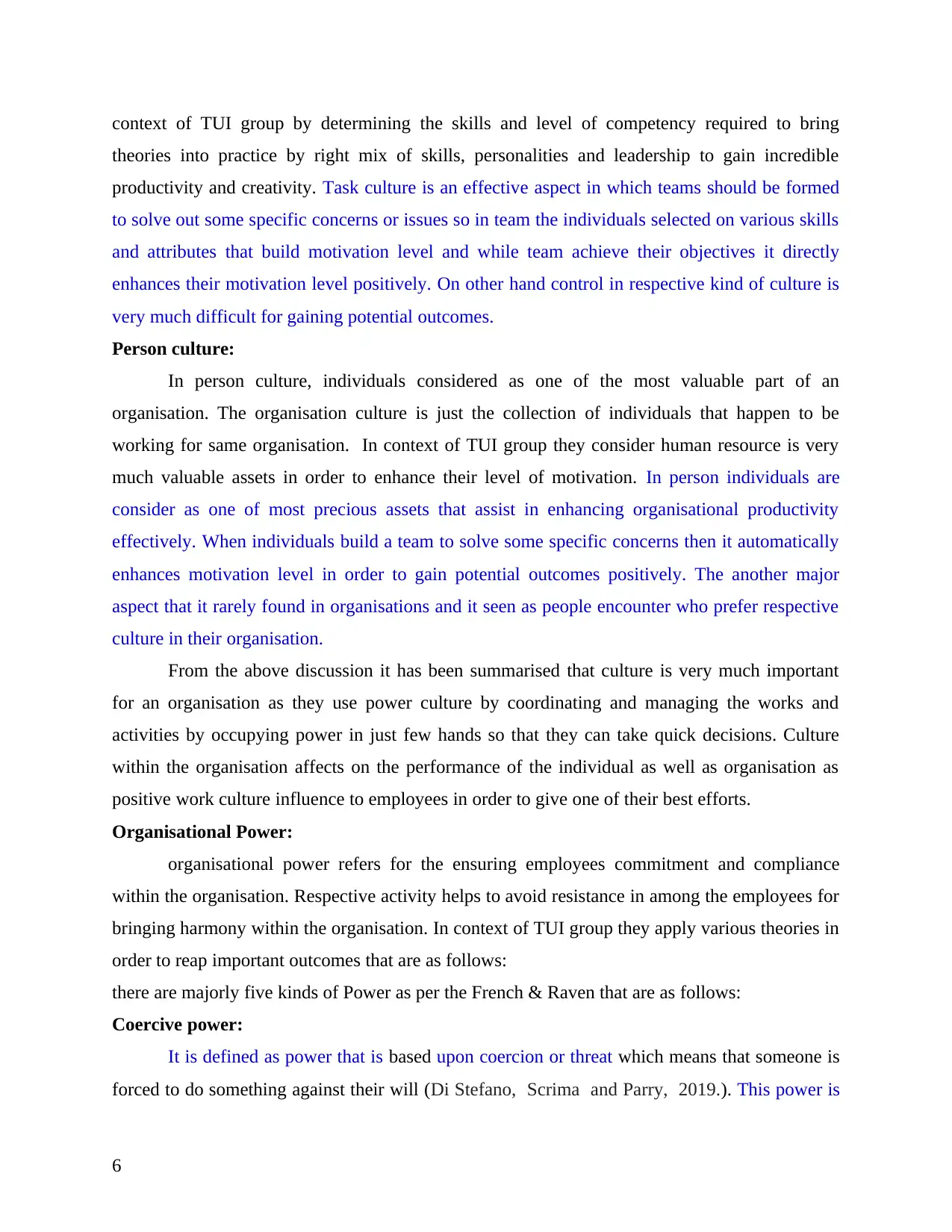
context of TUI group by determining the skills and level of competency required to bring
theories into practice by right mix of skills, personalities and leadership to gain incredible
productivity and creativity. Task culture is an effective aspect in which teams should be formed
to solve out some specific concerns or issues so in team the individuals selected on various skills
and attributes that build motivation level and while team achieve their objectives it directly
enhances their motivation level positively. On other hand control in respective kind of culture is
very much difficult for gaining potential outcomes.
Person culture:
In person culture, individuals considered as one of the most valuable part of an
organisation. The organisation culture is just the collection of individuals that happen to be
working for same organisation. In context of TUI group they consider human resource is very
much valuable assets in order to enhance their level of motivation. In person individuals are
consider as one of most precious assets that assist in enhancing organisational productivity
effectively. When individuals build a team to solve some specific concerns then it automatically
enhances motivation level in order to gain potential outcomes positively. The another major
aspect that it rarely found in organisations and it seen as people encounter who prefer respective
culture in their organisation.
From the above discussion it has been summarised that culture is very much important
for an organisation as they use power culture by coordinating and managing the works and
activities by occupying power in just few hands so that they can take quick decisions. Culture
within the organisation affects on the performance of the individual as well as organisation as
positive work culture influence to employees in order to give one of their best efforts.
Organisational Power:
organisational power refers for the ensuring employees commitment and compliance
within the organisation. Respective activity helps to avoid resistance in among the employees for
bringing harmony within the organisation. In context of TUI group they apply various theories in
order to reap important outcomes that are as follows:
there are majorly five kinds of Power as per the French & Raven that are as follows:
Coercive power:
It is defined as power that is based upon coercion or threat which means that someone is
forced to do something against their will (Di Stefano, Scrima and Parry, 2019.). This power is
6
theories into practice by right mix of skills, personalities and leadership to gain incredible
productivity and creativity. Task culture is an effective aspect in which teams should be formed
to solve out some specific concerns or issues so in team the individuals selected on various skills
and attributes that build motivation level and while team achieve their objectives it directly
enhances their motivation level positively. On other hand control in respective kind of culture is
very much difficult for gaining potential outcomes.
Person culture:
In person culture, individuals considered as one of the most valuable part of an
organisation. The organisation culture is just the collection of individuals that happen to be
working for same organisation. In context of TUI group they consider human resource is very
much valuable assets in order to enhance their level of motivation. In person individuals are
consider as one of most precious assets that assist in enhancing organisational productivity
effectively. When individuals build a team to solve some specific concerns then it automatically
enhances motivation level in order to gain potential outcomes positively. The another major
aspect that it rarely found in organisations and it seen as people encounter who prefer respective
culture in their organisation.
From the above discussion it has been summarised that culture is very much important
for an organisation as they use power culture by coordinating and managing the works and
activities by occupying power in just few hands so that they can take quick decisions. Culture
within the organisation affects on the performance of the individual as well as organisation as
positive work culture influence to employees in order to give one of their best efforts.
Organisational Power:
organisational power refers for the ensuring employees commitment and compliance
within the organisation. Respective activity helps to avoid resistance in among the employees for
bringing harmony within the organisation. In context of TUI group they apply various theories in
order to reap important outcomes that are as follows:
there are majorly five kinds of Power as per the French & Raven that are as follows:
Coercive power:
It is defined as power that is based upon coercion or threat which means that someone is
forced to do something against their will (Di Stefano, Scrima and Parry, 2019.). This power is
6
⊘ This is a preview!⊘
Do you want full access?
Subscribe today to unlock all pages.

Trusted by 1+ million students worldwide
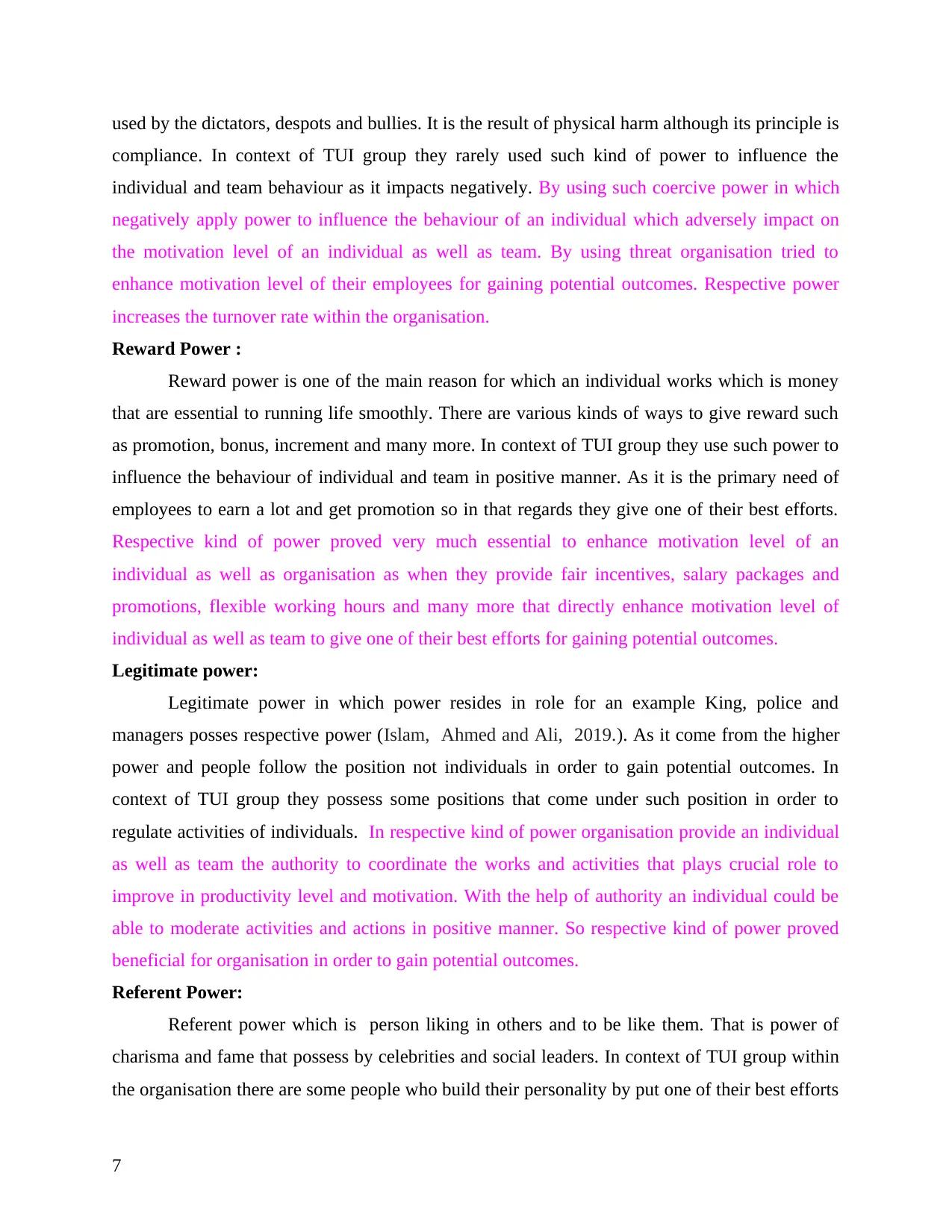
used by the dictators, despots and bullies. It is the result of physical harm although its principle is
compliance. In context of TUI group they rarely used such kind of power to influence the
individual and team behaviour as it impacts negatively. By using such coercive power in which
negatively apply power to influence the behaviour of an individual which adversely impact on
the motivation level of an individual as well as team. By using threat organisation tried to
enhance motivation level of their employees for gaining potential outcomes. Respective power
increases the turnover rate within the organisation.
Reward Power :
Reward power is one of the main reason for which an individual works which is money
that are essential to running life smoothly. There are various kinds of ways to give reward such
as promotion, bonus, increment and many more. In context of TUI group they use such power to
influence the behaviour of individual and team in positive manner. As it is the primary need of
employees to earn a lot and get promotion so in that regards they give one of their best efforts.
Respective kind of power proved very much essential to enhance motivation level of an
individual as well as organisation as when they provide fair incentives, salary packages and
promotions, flexible working hours and many more that directly enhance motivation level of
individual as well as team to give one of their best efforts for gaining potential outcomes.
Legitimate power:
Legitimate power in which power resides in role for an example King, police and
managers posses respective power (Islam, Ahmed and Ali, 2019.). As it come from the higher
power and people follow the position not individuals in order to gain potential outcomes. In
context of TUI group they possess some positions that come under such position in order to
regulate activities of individuals. In respective kind of power organisation provide an individual
as well as team the authority to coordinate the works and activities that plays crucial role to
improve in productivity level and motivation. With the help of authority an individual could be
able to moderate activities and actions in positive manner. So respective kind of power proved
beneficial for organisation in order to gain potential outcomes.
Referent Power:
Referent power which is person liking in others and to be like them. That is power of
charisma and fame that possess by celebrities and social leaders. In context of TUI group within
the organisation there are some people who build their personality by put one of their best efforts
7
compliance. In context of TUI group they rarely used such kind of power to influence the
individual and team behaviour as it impacts negatively. By using such coercive power in which
negatively apply power to influence the behaviour of an individual which adversely impact on
the motivation level of an individual as well as team. By using threat organisation tried to
enhance motivation level of their employees for gaining potential outcomes. Respective power
increases the turnover rate within the organisation.
Reward Power :
Reward power is one of the main reason for which an individual works which is money
that are essential to running life smoothly. There are various kinds of ways to give reward such
as promotion, bonus, increment and many more. In context of TUI group they use such power to
influence the behaviour of individual and team in positive manner. As it is the primary need of
employees to earn a lot and get promotion so in that regards they give one of their best efforts.
Respective kind of power proved very much essential to enhance motivation level of an
individual as well as organisation as when they provide fair incentives, salary packages and
promotions, flexible working hours and many more that directly enhance motivation level of
individual as well as team to give one of their best efforts for gaining potential outcomes.
Legitimate power:
Legitimate power in which power resides in role for an example King, police and
managers posses respective power (Islam, Ahmed and Ali, 2019.). As it come from the higher
power and people follow the position not individuals in order to gain potential outcomes. In
context of TUI group they possess some positions that come under such position in order to
regulate activities of individuals. In respective kind of power organisation provide an individual
as well as team the authority to coordinate the works and activities that plays crucial role to
improve in productivity level and motivation. With the help of authority an individual could be
able to moderate activities and actions in positive manner. So respective kind of power proved
beneficial for organisation in order to gain potential outcomes.
Referent Power:
Referent power which is person liking in others and to be like them. That is power of
charisma and fame that possess by celebrities and social leaders. In context of TUI group within
the organisation there are some people who build their personality by put one of their best efforts
7
Paraphrase This Document
Need a fresh take? Get an instant paraphrase of this document with our AI Paraphraser
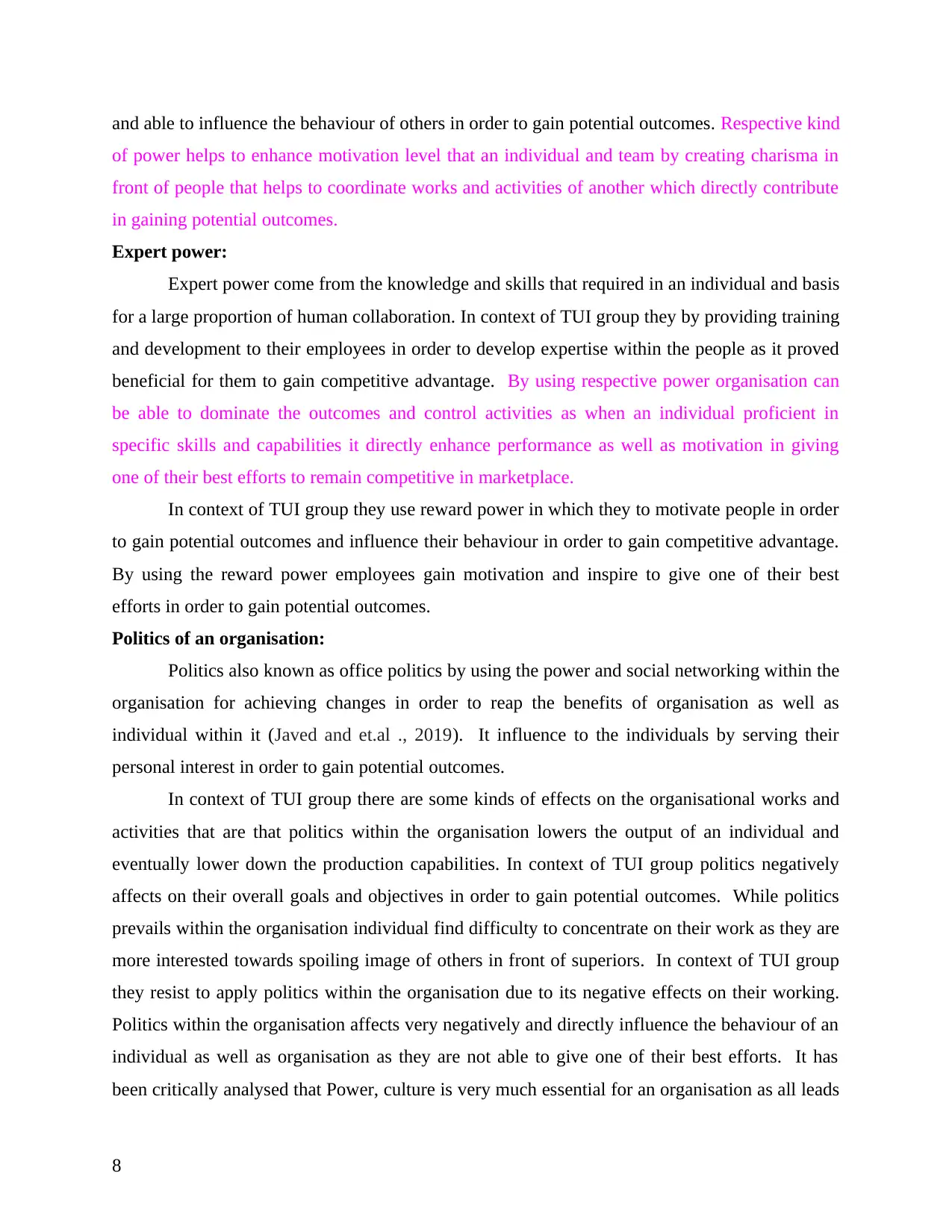
and able to influence the behaviour of others in order to gain potential outcomes. Respective kind
of power helps to enhance motivation level that an individual and team by creating charisma in
front of people that helps to coordinate works and activities of another which directly contribute
in gaining potential outcomes.
Expert power:
Expert power come from the knowledge and skills that required in an individual and basis
for a large proportion of human collaboration. In context of TUI group they by providing training
and development to their employees in order to develop expertise within the people as it proved
beneficial for them to gain competitive advantage. By using respective power organisation can
be able to dominate the outcomes and control activities as when an individual proficient in
specific skills and capabilities it directly enhance performance as well as motivation in giving
one of their best efforts to remain competitive in marketplace.
In context of TUI group they use reward power in which they to motivate people in order
to gain potential outcomes and influence their behaviour in order to gain competitive advantage.
By using the reward power employees gain motivation and inspire to give one of their best
efforts in order to gain potential outcomes.
Politics of an organisation:
Politics also known as office politics by using the power and social networking within the
organisation for achieving changes in order to reap the benefits of organisation as well as
individual within it (Javed and et.al ., 2019). It influence to the individuals by serving their
personal interest in order to gain potential outcomes.
In context of TUI group there are some kinds of effects on the organisational works and
activities that are that politics within the organisation lowers the output of an individual and
eventually lower down the production capabilities. In context of TUI group politics negatively
affects on their overall goals and objectives in order to gain potential outcomes. While politics
prevails within the organisation individual find difficulty to concentrate on their work as they are
more interested towards spoiling image of others in front of superiors. In context of TUI group
they resist to apply politics within the organisation due to its negative effects on their working.
Politics within the organisation affects very negatively and directly influence the behaviour of an
individual as well as organisation as they are not able to give one of their best efforts. It has
been critically analysed that Power, culture is very much essential for an organisation as all leads
8
of power helps to enhance motivation level that an individual and team by creating charisma in
front of people that helps to coordinate works and activities of another which directly contribute
in gaining potential outcomes.
Expert power:
Expert power come from the knowledge and skills that required in an individual and basis
for a large proportion of human collaboration. In context of TUI group they by providing training
and development to their employees in order to develop expertise within the people as it proved
beneficial for them to gain competitive advantage. By using respective power organisation can
be able to dominate the outcomes and control activities as when an individual proficient in
specific skills and capabilities it directly enhance performance as well as motivation in giving
one of their best efforts to remain competitive in marketplace.
In context of TUI group they use reward power in which they to motivate people in order
to gain potential outcomes and influence their behaviour in order to gain competitive advantage.
By using the reward power employees gain motivation and inspire to give one of their best
efforts in order to gain potential outcomes.
Politics of an organisation:
Politics also known as office politics by using the power and social networking within the
organisation for achieving changes in order to reap the benefits of organisation as well as
individual within it (Javed and et.al ., 2019). It influence to the individuals by serving their
personal interest in order to gain potential outcomes.
In context of TUI group there are some kinds of effects on the organisational works and
activities that are that politics within the organisation lowers the output of an individual and
eventually lower down the production capabilities. In context of TUI group politics negatively
affects on their overall goals and objectives in order to gain potential outcomes. While politics
prevails within the organisation individual find difficulty to concentrate on their work as they are
more interested towards spoiling image of others in front of superiors. In context of TUI group
they resist to apply politics within the organisation due to its negative effects on their working.
Politics within the organisation affects very negatively and directly influence the behaviour of an
individual as well as organisation as they are not able to give one of their best efforts. It has
been critically analysed that Power, culture is very much essential for an organisation as all leads
8
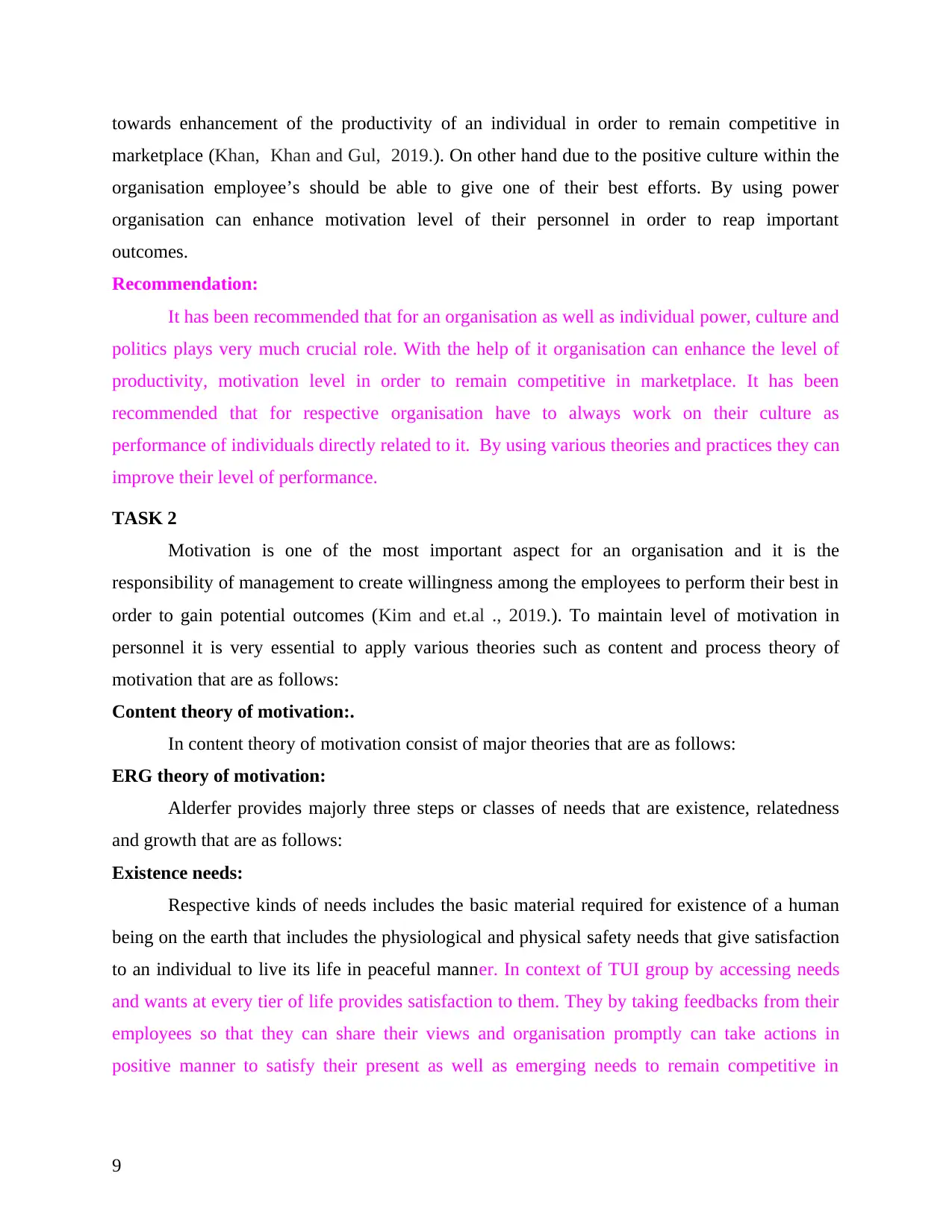
towards enhancement of the productivity of an individual in order to remain competitive in
marketplace (Khan, Khan and Gul, 2019.). On other hand due to the positive culture within the
organisation employee’s should be able to give one of their best efforts. By using power
organisation can enhance motivation level of their personnel in order to reap important
outcomes.
Recommendation:
It has been recommended that for an organisation as well as individual power, culture and
politics plays very much crucial role. With the help of it organisation can enhance the level of
productivity, motivation level in order to remain competitive in marketplace. It has been
recommended that for respective organisation have to always work on their culture as
performance of individuals directly related to it. By using various theories and practices they can
improve their level of performance.
TASK 2
Motivation is one of the most important aspect for an organisation and it is the
responsibility of management to create willingness among the employees to perform their best in
order to gain potential outcomes (Kim and et.al ., 2019.). To maintain level of motivation in
personnel it is very essential to apply various theories such as content and process theory of
motivation that are as follows:
Content theory of motivation:.
In content theory of motivation consist of major theories that are as follows:
ERG theory of motivation:
Alderfer provides majorly three steps or classes of needs that are existence, relatedness
and growth that are as follows:
Existence needs:
Respective kinds of needs includes the basic material required for existence of a human
being on the earth that includes the physiological and physical safety needs that give satisfaction
to an individual to live its life in peaceful manner. In context of TUI group by accessing needs
and wants at every tier of life provides satisfaction to them. They by taking feedbacks from their
employees so that they can share their views and organisation promptly can take actions in
positive manner to satisfy their present as well as emerging needs to remain competitive in
9
marketplace (Khan, Khan and Gul, 2019.). On other hand due to the positive culture within the
organisation employee’s should be able to give one of their best efforts. By using power
organisation can enhance motivation level of their personnel in order to reap important
outcomes.
Recommendation:
It has been recommended that for an organisation as well as individual power, culture and
politics plays very much crucial role. With the help of it organisation can enhance the level of
productivity, motivation level in order to remain competitive in marketplace. It has been
recommended that for respective organisation have to always work on their culture as
performance of individuals directly related to it. By using various theories and practices they can
improve their level of performance.
TASK 2
Motivation is one of the most important aspect for an organisation and it is the
responsibility of management to create willingness among the employees to perform their best in
order to gain potential outcomes (Kim and et.al ., 2019.). To maintain level of motivation in
personnel it is very essential to apply various theories such as content and process theory of
motivation that are as follows:
Content theory of motivation:.
In content theory of motivation consist of major theories that are as follows:
ERG theory of motivation:
Alderfer provides majorly three steps or classes of needs that are existence, relatedness
and growth that are as follows:
Existence needs:
Respective kinds of needs includes the basic material required for existence of a human
being on the earth that includes the physiological and physical safety needs that give satisfaction
to an individual to live its life in peaceful manner. In context of TUI group by accessing needs
and wants at every tier of life provides satisfaction to them. They by taking feedbacks from their
employees so that they can share their views and organisation promptly can take actions in
positive manner to satisfy their present as well as emerging needs to remain competitive in
9
⊘ This is a preview!⊘
Do you want full access?
Subscribe today to unlock all pages.

Trusted by 1+ million students worldwide
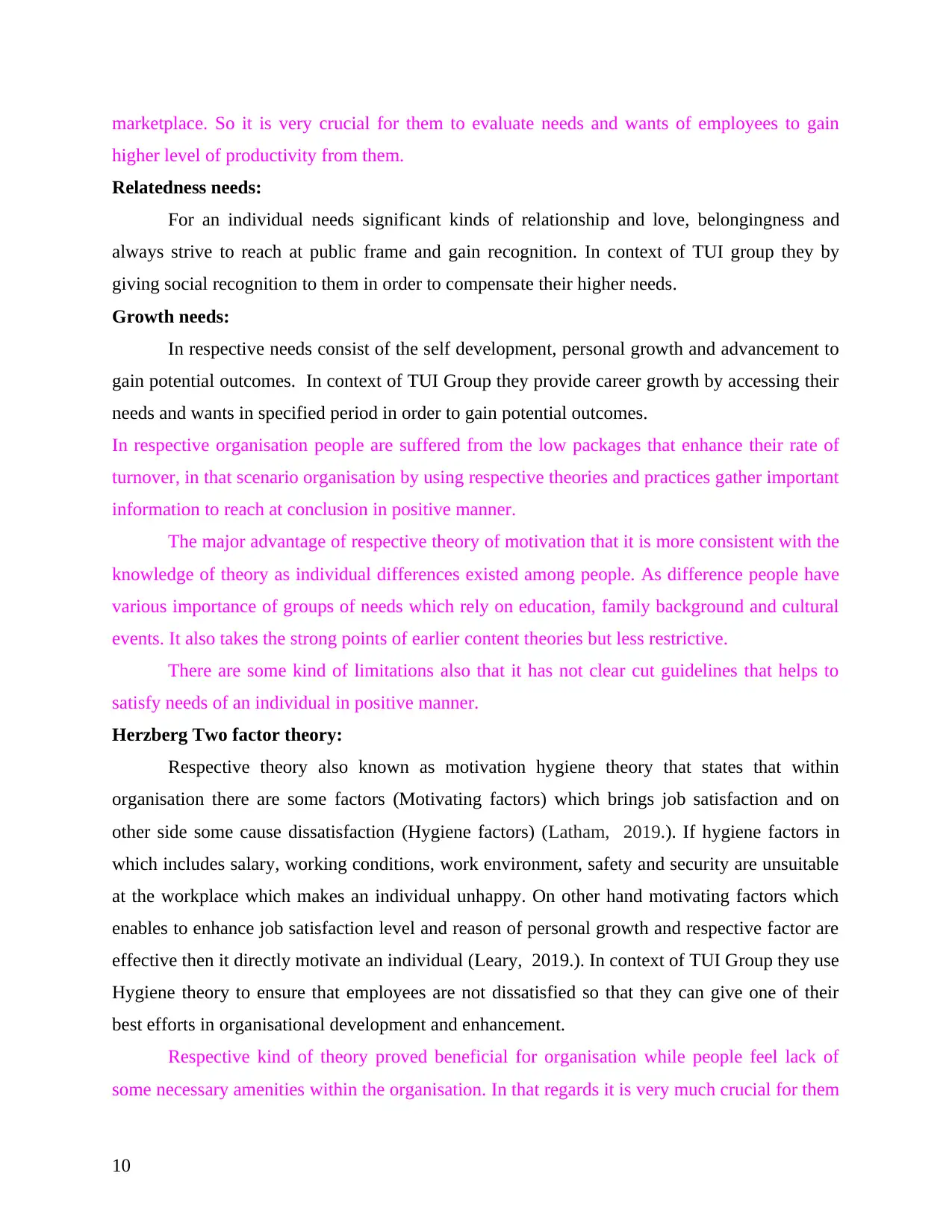
marketplace. So it is very crucial for them to evaluate needs and wants of employees to gain
higher level of productivity from them.
Relatedness needs:
For an individual needs significant kinds of relationship and love, belongingness and
always strive to reach at public frame and gain recognition. In context of TUI group they by
giving social recognition to them in order to compensate their higher needs.
Growth needs:
In respective needs consist of the self development, personal growth and advancement to
gain potential outcomes. In context of TUI Group they provide career growth by accessing their
needs and wants in specified period in order to gain potential outcomes.
In respective organisation people are suffered from the low packages that enhance their rate of
turnover, in that scenario organisation by using respective theories and practices gather important
information to reach at conclusion in positive manner.
The major advantage of respective theory of motivation that it is more consistent with the
knowledge of theory as individual differences existed among people. As difference people have
various importance of groups of needs which rely on education, family background and cultural
events. It also takes the strong points of earlier content theories but less restrictive.
There are some kind of limitations also that it has not clear cut guidelines that helps to
satisfy needs of an individual in positive manner.
Herzberg Two factor theory:
Respective theory also known as motivation hygiene theory that states that within
organisation there are some factors (Motivating factors) which brings job satisfaction and on
other side some cause dissatisfaction (Hygiene factors) (Latham, 2019.). If hygiene factors in
which includes salary, working conditions, work environment, safety and security are unsuitable
at the workplace which makes an individual unhappy. On other hand motivating factors which
enables to enhance job satisfaction level and reason of personal growth and respective factor are
effective then it directly motivate an individual (Leary, 2019.). In context of TUI Group they use
Hygiene theory to ensure that employees are not dissatisfied so that they can give one of their
best efforts in organisational development and enhancement.
Respective kind of theory proved beneficial for organisation while people feel lack of
some necessary amenities within the organisation. In that regards it is very much crucial for them
10
higher level of productivity from them.
Relatedness needs:
For an individual needs significant kinds of relationship and love, belongingness and
always strive to reach at public frame and gain recognition. In context of TUI group they by
giving social recognition to them in order to compensate their higher needs.
Growth needs:
In respective needs consist of the self development, personal growth and advancement to
gain potential outcomes. In context of TUI Group they provide career growth by accessing their
needs and wants in specified period in order to gain potential outcomes.
In respective organisation people are suffered from the low packages that enhance their rate of
turnover, in that scenario organisation by using respective theories and practices gather important
information to reach at conclusion in positive manner.
The major advantage of respective theory of motivation that it is more consistent with the
knowledge of theory as individual differences existed among people. As difference people have
various importance of groups of needs which rely on education, family background and cultural
events. It also takes the strong points of earlier content theories but less restrictive.
There are some kind of limitations also that it has not clear cut guidelines that helps to
satisfy needs of an individual in positive manner.
Herzberg Two factor theory:
Respective theory also known as motivation hygiene theory that states that within
organisation there are some factors (Motivating factors) which brings job satisfaction and on
other side some cause dissatisfaction (Hygiene factors) (Latham, 2019.). If hygiene factors in
which includes salary, working conditions, work environment, safety and security are unsuitable
at the workplace which makes an individual unhappy. On other hand motivating factors which
enables to enhance job satisfaction level and reason of personal growth and respective factor are
effective then it directly motivate an individual (Leary, 2019.). In context of TUI Group they use
Hygiene theory to ensure that employees are not dissatisfied so that they can give one of their
best efforts in organisational development and enhancement.
Respective kind of theory proved beneficial for organisation while people feel lack of
some necessary amenities within the organisation. In that regards it is very much crucial for them
10
Paraphrase This Document
Need a fresh take? Get an instant paraphrase of this document with our AI Paraphraser
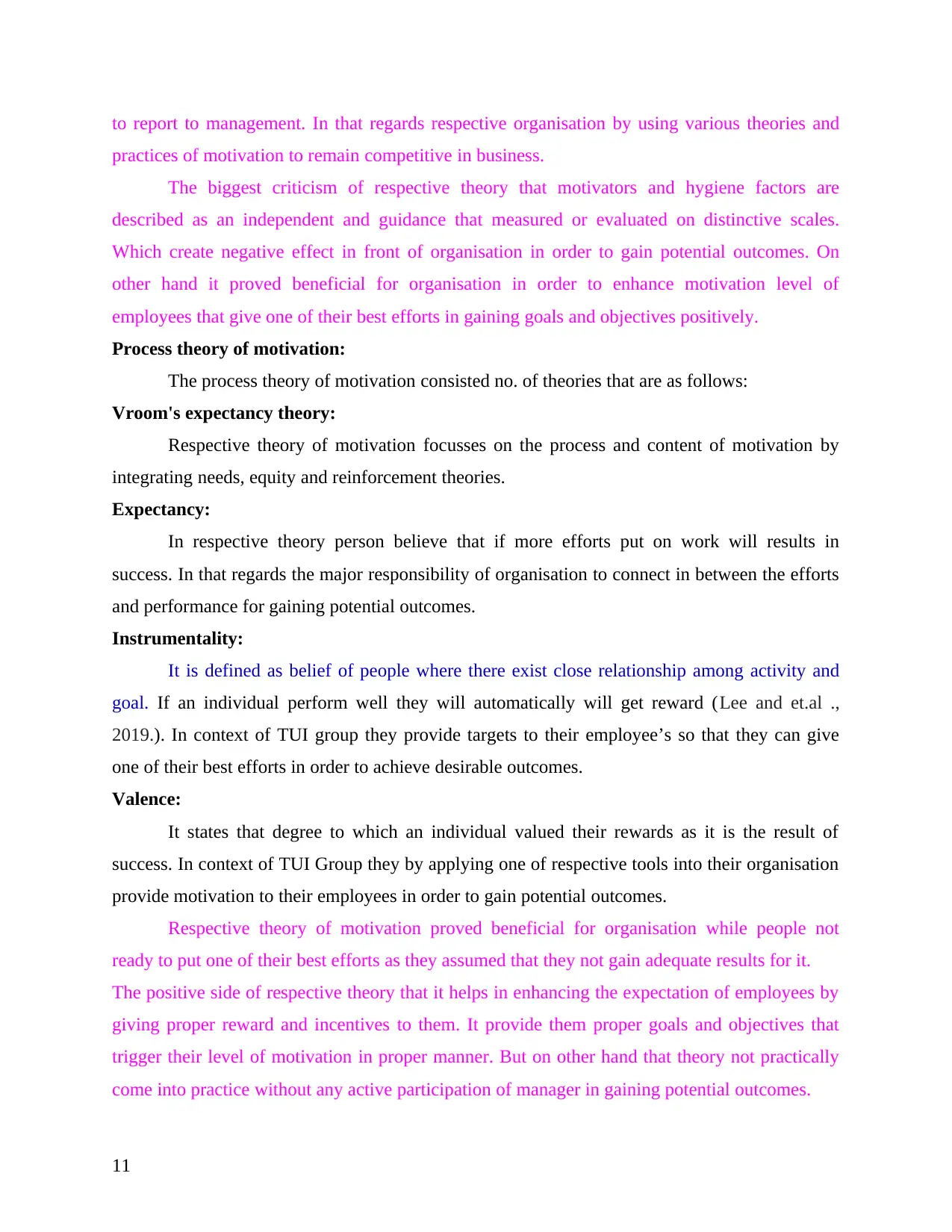
to report to management. In that regards respective organisation by using various theories and
practices of motivation to remain competitive in business.
The biggest criticism of respective theory that motivators and hygiene factors are
described as an independent and guidance that measured or evaluated on distinctive scales.
Which create negative effect in front of organisation in order to gain potential outcomes. On
other hand it proved beneficial for organisation in order to enhance motivation level of
employees that give one of their best efforts in gaining goals and objectives positively.
Process theory of motivation:
The process theory of motivation consisted no. of theories that are as follows:
Vroom's expectancy theory:
Respective theory of motivation focusses on the process and content of motivation by
integrating needs, equity and reinforcement theories.
Expectancy:
In respective theory person believe that if more efforts put on work will results in
success. In that regards the major responsibility of organisation to connect in between the efforts
and performance for gaining potential outcomes.
Instrumentality:
It is defined as belief of people where there exist close relationship among activity and
goal. If an individual perform well they will automatically will get reward (Lee and et.al .,
2019.). In context of TUI group they provide targets to their employee’s so that they can give
one of their best efforts in order to achieve desirable outcomes.
Valence:
It states that degree to which an individual valued their rewards as it is the result of
success. In context of TUI Group they by applying one of respective tools into their organisation
provide motivation to their employees in order to gain potential outcomes.
Respective theory of motivation proved beneficial for organisation while people not
ready to put one of their best efforts as they assumed that they not gain adequate results for it.
The positive side of respective theory that it helps in enhancing the expectation of employees by
giving proper reward and incentives to them. It provide them proper goals and objectives that
trigger their level of motivation in proper manner. But on other hand that theory not practically
come into practice without any active participation of manager in gaining potential outcomes.
11
practices of motivation to remain competitive in business.
The biggest criticism of respective theory that motivators and hygiene factors are
described as an independent and guidance that measured or evaluated on distinctive scales.
Which create negative effect in front of organisation in order to gain potential outcomes. On
other hand it proved beneficial for organisation in order to enhance motivation level of
employees that give one of their best efforts in gaining goals and objectives positively.
Process theory of motivation:
The process theory of motivation consisted no. of theories that are as follows:
Vroom's expectancy theory:
Respective theory of motivation focusses on the process and content of motivation by
integrating needs, equity and reinforcement theories.
Expectancy:
In respective theory person believe that if more efforts put on work will results in
success. In that regards the major responsibility of organisation to connect in between the efforts
and performance for gaining potential outcomes.
Instrumentality:
It is defined as belief of people where there exist close relationship among activity and
goal. If an individual perform well they will automatically will get reward (Lee and et.al .,
2019.). In context of TUI group they provide targets to their employee’s so that they can give
one of their best efforts in order to achieve desirable outcomes.
Valence:
It states that degree to which an individual valued their rewards as it is the result of
success. In context of TUI Group they by applying one of respective tools into their organisation
provide motivation to their employees in order to gain potential outcomes.
Respective theory of motivation proved beneficial for organisation while people not
ready to put one of their best efforts as they assumed that they not gain adequate results for it.
The positive side of respective theory that it helps in enhancing the expectation of employees by
giving proper reward and incentives to them. It provide them proper goals and objectives that
trigger their level of motivation in proper manner. But on other hand that theory not practically
come into practice without any active participation of manager in gaining potential outcomes.
11
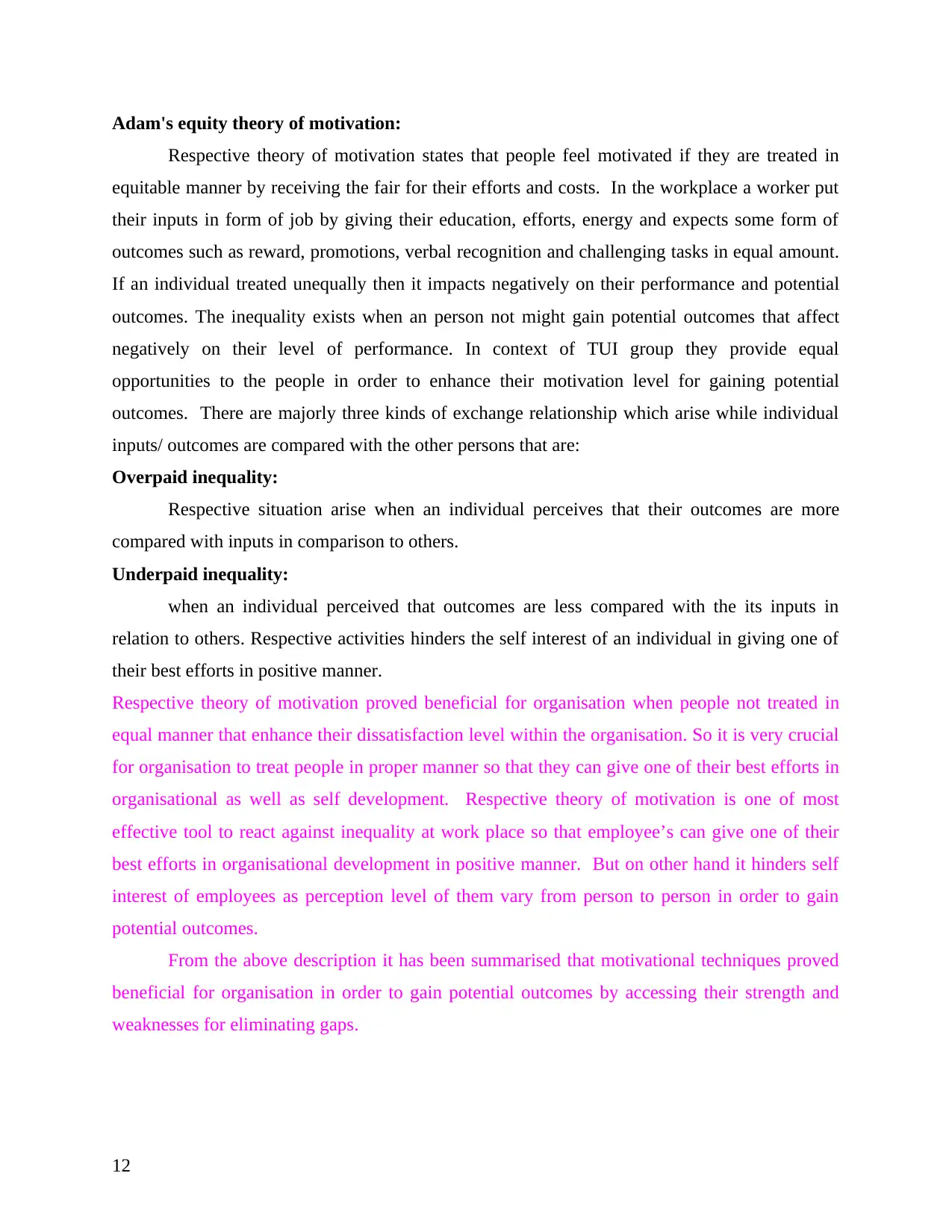
Adam's equity theory of motivation:
Respective theory of motivation states that people feel motivated if they are treated in
equitable manner by receiving the fair for their efforts and costs. In the workplace a worker put
their inputs in form of job by giving their education, efforts, energy and expects some form of
outcomes such as reward, promotions, verbal recognition and challenging tasks in equal amount.
If an individual treated unequally then it impacts negatively on their performance and potential
outcomes. The inequality exists when an person not might gain potential outcomes that affect
negatively on their level of performance. In context of TUI group they provide equal
opportunities to the people in order to enhance their motivation level for gaining potential
outcomes. There are majorly three kinds of exchange relationship which arise while individual
inputs/ outcomes are compared with the other persons that are:
Overpaid inequality:
Respective situation arise when an individual perceives that their outcomes are more
compared with inputs in comparison to others.
Underpaid inequality:
when an individual perceived that outcomes are less compared with the its inputs in
relation to others. Respective activities hinders the self interest of an individual in giving one of
their best efforts in positive manner.
Respective theory of motivation proved beneficial for organisation when people not treated in
equal manner that enhance their dissatisfaction level within the organisation. So it is very crucial
for organisation to treat people in proper manner so that they can give one of their best efforts in
organisational as well as self development. Respective theory of motivation is one of most
effective tool to react against inequality at work place so that employee’s can give one of their
best efforts in organisational development in positive manner. But on other hand it hinders self
interest of employees as perception level of them vary from person to person in order to gain
potential outcomes.
From the above description it has been summarised that motivational techniques proved
beneficial for organisation in order to gain potential outcomes by accessing their strength and
weaknesses for eliminating gaps.
12
Respective theory of motivation states that people feel motivated if they are treated in
equitable manner by receiving the fair for their efforts and costs. In the workplace a worker put
their inputs in form of job by giving their education, efforts, energy and expects some form of
outcomes such as reward, promotions, verbal recognition and challenging tasks in equal amount.
If an individual treated unequally then it impacts negatively on their performance and potential
outcomes. The inequality exists when an person not might gain potential outcomes that affect
negatively on their level of performance. In context of TUI group they provide equal
opportunities to the people in order to enhance their motivation level for gaining potential
outcomes. There are majorly three kinds of exchange relationship which arise while individual
inputs/ outcomes are compared with the other persons that are:
Overpaid inequality:
Respective situation arise when an individual perceives that their outcomes are more
compared with inputs in comparison to others.
Underpaid inequality:
when an individual perceived that outcomes are less compared with the its inputs in
relation to others. Respective activities hinders the self interest of an individual in giving one of
their best efforts in positive manner.
Respective theory of motivation proved beneficial for organisation when people not treated in
equal manner that enhance their dissatisfaction level within the organisation. So it is very crucial
for organisation to treat people in proper manner so that they can give one of their best efforts in
organisational as well as self development. Respective theory of motivation is one of most
effective tool to react against inequality at work place so that employee’s can give one of their
best efforts in organisational development in positive manner. But on other hand it hinders self
interest of employees as perception level of them vary from person to person in order to gain
potential outcomes.
From the above description it has been summarised that motivational techniques proved
beneficial for organisation in order to gain potential outcomes by accessing their strength and
weaknesses for eliminating gaps.
12
⊘ This is a preview!⊘
Do you want full access?
Subscribe today to unlock all pages.

Trusted by 1+ million students worldwide
1 out of 19
Related Documents
Your All-in-One AI-Powered Toolkit for Academic Success.
+13062052269
info@desklib.com
Available 24*7 on WhatsApp / Email
![[object Object]](/_next/static/media/star-bottom.7253800d.svg)
Unlock your academic potential
Copyright © 2020–2026 A2Z Services. All Rights Reserved. Developed and managed by ZUCOL.





